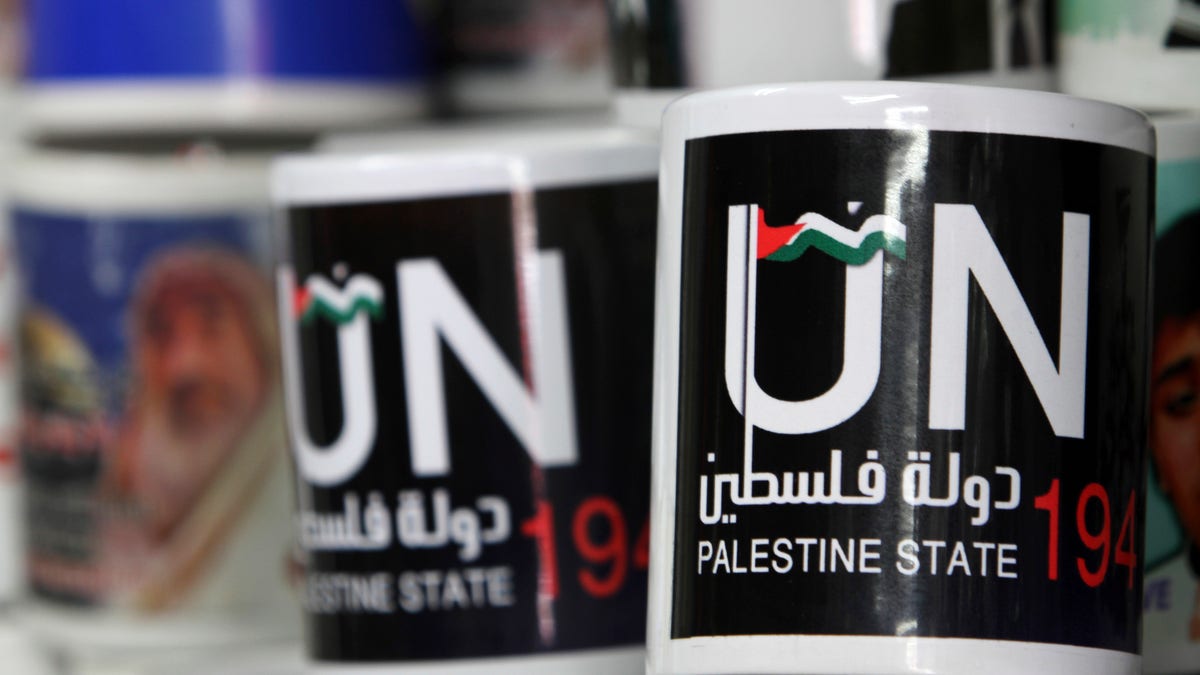
Cups designed as part of the campaign promoting the Palestinians' bid for statehood are displayed in a souvenirs shop in Gaza City, Tuesday, Sept. 13, 2011. (AP2011)
As the United Nations prepares to convene its annual General Assembly in New York next week, a key congresswoman is calling for the U.S. to withhold aid to the Palestinians unless they drop attempts to get the world body to recognize an independent Palestinian state – a move that both Washington and Israel opposes.
Rep. Ilena Ros-Lehtinen, chairwoman of the House Foreign Relations Committee, also wants to persuade the U.N. to refrain from recognizing an independent Palestinian state if the Palestinians ask.
Ros-Lehtinen, a frequent critic of the U.N., is pushing a plan to withhold or slash U.S. money earmarked for the world body. And she held a hearing Wednesday to examine the $500 million in annual aid the U.S. provides to the Palestinians.
“Despite decades of assistance totaling billions of dollars, if a Palestinian state were declared today, it would be neither democratic nor peaceful nor willing to negotiate with Israel,” Ros-Lehtinen said at the hearing Wednesday. “By providing the Palestinians with $2.5 billion over the last five years, the U.S. has only rewarded and reinforced their bad behavior.”
The Palestinians are turning to the U.N. after peace talks with Israel broke down, hoping U.N. backing would boost their statehood drive. But Israel and the U.S. say there is no substitute for negotiations.
- The Time Is Now for a Three-State Solution to End the Israeli-Palestinian Conflict
- Palestinian Leader Will Ask for Full U.N. Membership
- Israel Clears Out Embassy Staff in Jordan Ahead of Protest
- Palestinians to Seek Full U.N. Membership Sept. 23
- Jordan Prefers Talks for Palestinian State
- U.S. Envoys Returning to Mideast to Try to Avert Palestinian Statehood Vote
State Department spokesman Mark Toner said Wednesday the U.S. continues to see any kind of effort by the Palestinians at the U.N. gathering in New York as “counterproductive.”
He said a vote for Palestinian statehood is an “anti-Israel vote.”
Toner wouldn’t say what the consequences would be if the Palestinians followed through on their plan, asserting that instead of relying on threats, the U.S. would rely on strong arguments that such an approach doesn’t “get us to where we need to be, which is to the negotiation table.”
The U.S. has threatened to veto any bid for recognition in the U.N. Security Council. But Ros-Lehtinen says the Palestinians will likely submit their request to the General Assembly, where the U.S. does not have a veto.
Ros-Lehtinen has introduced a bill that would block U.S. money for any United Nations entity that supports giving Palestine an elevated status at the U.N. and ban U.S. contributions to the U.N. Human Rights Council and an anti-racism conference seen as a platform for anti-Israel rhetoric.
The legislation, which has more than 50 Republican co-sponsors, would also pressure the U.N. to adopt a voluntary funding system by withholding 50 percent of the U.S. nonvoluntary regular budget contributions if, after two years, 80 percent of the U.N. regular budget is not funded on a voluntary rather than assessed basis.
The Obama administration has called the legislation “backward” and said it would seriously undermine America’s role as a world leader.
In the 2010 budget year the U.S. provided $7.7 billion to the U.N. for its regular budget, peacekeeping and other programs, up from $6.1 billion the previous year.
The State Department does not support the bill and it is unlikely to get through a Democratic-controlled Senate.
But cutting off U.S. aid to the Palestinians could gain traction in Congress depending on what happens next week.
Elliott Abrams, a senior fellow for Middle Eastern Studies at the Council on Foreign Relations and a former aide to President Bush, said that some aid, such as the security programs, should not be touched in the interest of the U.S. and Israel.
“All of us want an Israeli-Palestinian peace and want the Palestinians to be able to build up the institutions they will someday need to establish a decent and democratic state. Our aid programs help in that work. Ending them can set back those efforts,” he said.
He suggested that the U.S. should wait to see what happens after the U.N. vote.
“If they then say, well, now we have our symbolic victory and now we want to go to negotiations, without preconditions, obviously that move should be met with approval,” he said. “On the other hand, if they move immediately to create large and dangerous demonstrations, and immediately rush off to the International Criminal Court to demand prosecutions of Israeli officials, it will be obvious that they want confrontation, not peace.
"And they should know what that means for aid levels. But keeping some of your powder dry is probably a good idea.”
The Associated Press contributed to this report.
